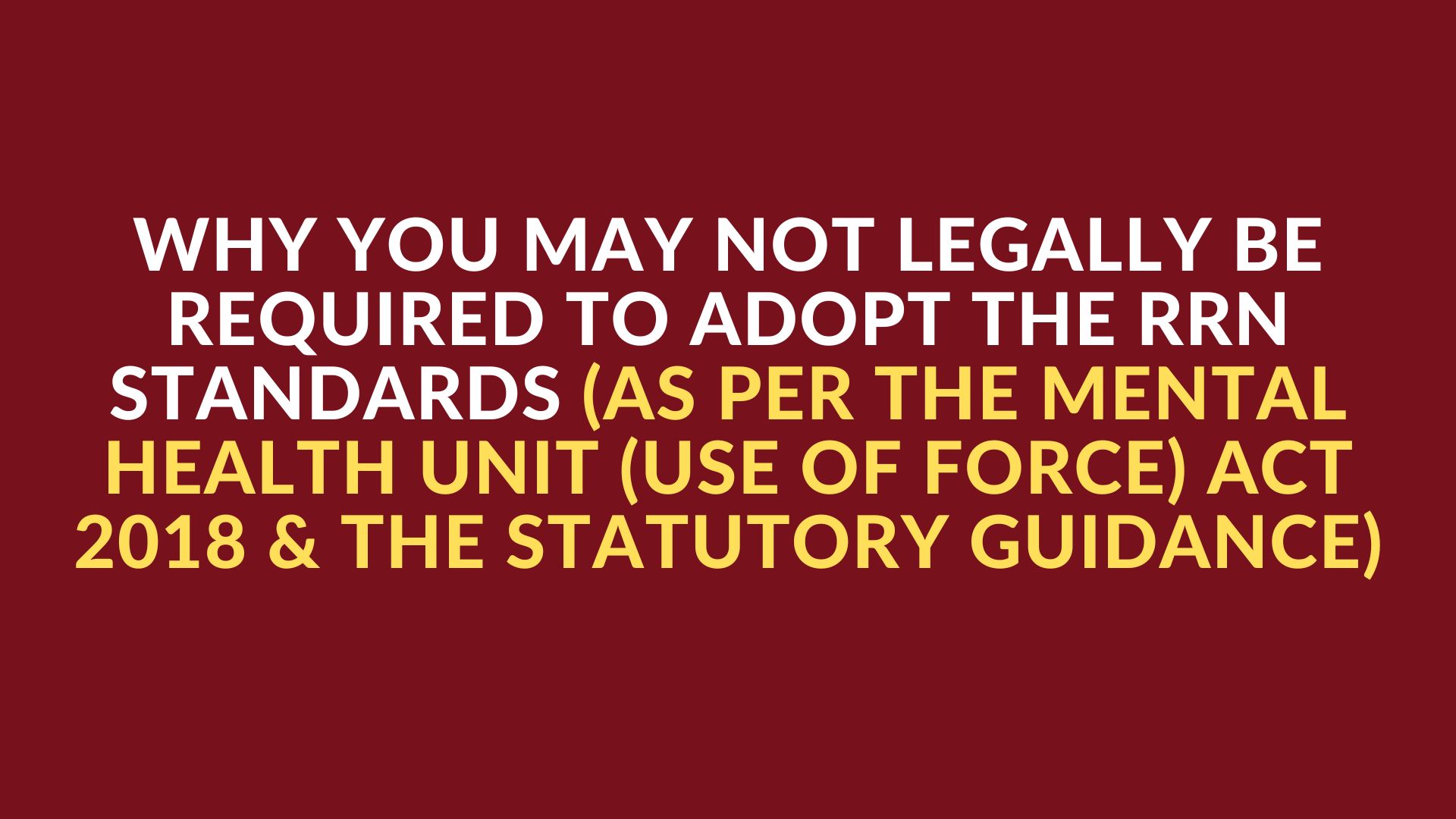There has been a lot of emphasis by various parties, including some training providers, to ‘push’ organisations to comply with the RRN (Restraint Reduction Network) Standards, when clearly they do not need to do so.
In some cases this is for nothing more than to generate business for themselves at an expense (in some cases at very high financial cost) that the organisation doesn’t have to comply with the RRN standards.
In other cases it may simply be because the person ‘pushing’ organisations to adopt the RRN standards is either misinformed or has not done their own due diligence as to what organisation need to and do not need to, comply with the standards.
Therefore, with the help of a very eminent lawyer I have put together the following template letter that you are welcome to download and use as a way of demonstrating that you do not need to comply with the RRN standards.
You will of course have to justify via your own training implementation that you do have training in place that is fit for purpose.
The letter (which is also available for you to download and use at the bottom of this email) is as follows:
DISCLAIMER: All of the information provided below has been researched and checked by us. It is accurate at the date of publication. However, it is your responsibility to do your own due diligence and check the following out for yourself to ensure that it is still current and correct should you wish to use all or part of this document. NFPS Ltd accepts no responsibility for any use or publication of this document by any third party.
Perhaps the approach to take if an inspector, trainer or anyone else advises you that you should be complying with the RRN (Restraint Reduction Network) standards is to advise them of the following:
As a [xyz] organisation, we are outside of the scope of the very limited categories set out by the Mental Health Units (Use of Force) Act 2018 Act and the statutory guidance issued by the Secretary of State for Health and Social Care under section 11 of the Health & Social Care Act 2012.
Therefore, we are not legally required to comply with the RRN (Restraint Reduction Network) standards.
For clarification, the categories that must comply with the Mental Health Units (Use of Force) Act 2018 and the statutory guidance are (as taken directly from the statutory guidance) are:
“Mental Health Unit is described as a health service hospital or independent hospital in England (or part thereof) that provides treatment to inpatients for a mental disorder. An independent hospital (or part thereof) will only be a ‘mental health unit’ if its purpose is “to provide treatment to inpatients for mental disorder”, and “at least some of that treatment is provided, or is intended to be provided, for the purposes of the NHS.”
“The types of inpatient service which would be considered within the definition of a mental health unit (this is not an exhaustive list) include:
- acute mental health wards for adults of working age and psychiatric intensive care units
- long stay or rehabilitation mental health wards for working age adults
- forensic inpatient or secure wards (low, medium and high)
- child and adolescent mental health wards
- wards for older people with mental health problems 16
- wards for people with autism or a learning disability
- specialist mental health eating disorder services
- inpatient mother and baby units
- acute hospital wards where patients are “detained under the Mental Health Act 1983 for assessment and treatment of their mental disorder”.
The following services are considered to be outside of the definition of a mental health unit (this is not an exhaustive list) and therefore not covered by the requirements of the act:
- accident and emergency departments of emergency departments
- section 135 and 136 suites that are outside of a mental health unit
- outpatient departments or clinics
- mental health transport vehicles.”
The statutory guidance also states that: “Certified training that complies with the RRN Training Standards became a requirement of NHS commissioned services for people with learning disabilities, autism or mental health conditions in April 2020”.
Outside of the very limited categories where the Act applies, we have heard that other services are being encouraged to have their training certified by BILD as complying with the RRN training standards. There is no requirement for us to do so.
Also, if we were bound by the conditions of the NHS standard contract, we are aware of the following provision:
Section 41 of The NHS Standard Contract 2021/22 Technical Guidance (Mandatory Service Development & Improvement Plans (SDIPs).
Section 41 of the NHS Standard Contract 2021/22 Technical Guidance document covers mandatory Service Development & Improvement Plan’s (SDI’s)
Section 41(6) also makes it very clear that the intention of mandatory SDIPs (Service Development and Improvement Plans) is not to require significant additional investment from commissioners or providers; rather, it is to encourage joint management action to tackle important priorities to the extent possible within available resources.
Therefore, even if we were considering voluntarily having our training certificated by BILD as complying with the RRN Training Standards we are aware of section 41.
The ‘Reasonably Practicable’ Argument (Cost vs Risk)
Our training provision is based on the training control measures identified in a suitable and sufficient risk assessment (as required under Health and Safety legislation).
This means that the training we provide has been justified on a risk vs cost basis.
Therefore, we feel that adoption of the RRN training standards would:
a): Reduce compliance;
b): Be an additional unnecessary expense;
c): Possibly be detrimental to staff and service user safety;
d): Possibly even breach health & safety by making us train outside of our risk assessed training provision;
You can download a copy of the letter here – Letter Re-RRN Compliance (final)

